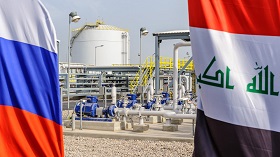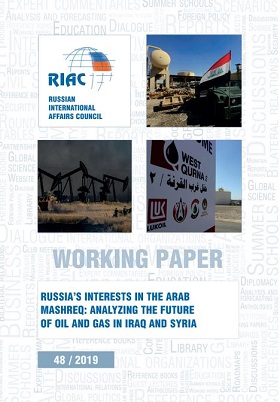Iraq is one of the few countries to benefit from the Iranian sanctions’ exemptions. The United States has repeatedly extended the period of a sanctions waiver for Iraq — most recently in September — due to Baghdad's dependence on Iran’s gas and electricity. Iraq’s need to comply with the OPEC+ quotas has a negative impact on the situation, since with the cut of oil production in Iraq the volume of associated gas production also decreased. And this, in turn, again increases dependence on the gas imported from Iran.
If Baghdad loses the possibility to import electricity from Iran, Iraq will not be able to receive the same volume from another source. After Iraq's OPEC+ agreement partners expressed dissatisfaction with Baghdad’s failure to comply with the terms of the deal in May and June, Baghdad abided by the quotas in August, when the production amounted to 3.023 million barrels per day. Thus, Iraq was again forced to ask for so-called compensatory cuts, i.e., cutting production to compensate for overproduction in prior months.
OPEC+ members that exceeded their oil production in May-July have committed to further production cuts. Iraq accounts for the largest share of the total 2.375 million barrels per day of the compensatory cuts. Despite such export volumes, the implementation of the Iraqi budget is experiencing serious problems, as the increasing number of cases of the coronavirus exacerbate the situation.
To comply with the OPEC+ deal, the federal Iraqi government in Baghdad and the Kurdistan Regional Government (KRG) in Erbil had previously agreed on a proportional cut in oil production. However, after receiving the data on oil exports for September 2020, the government in Baghdad, represented by Deputy Prime Minister and Finance Minsiter Ali Allawi, accused the KRG of exceeding the export quotas. According to figures of Iraq's state oil company State Organization for Marketing of Oil, dated Sept. 10, Erbil fulfilled its obligations under the quotas by only 79%, while Baghdad did so by 102%. Iraqi Kurdistan denied all the accusations. Nevertheless, the parties agreed to continue working together to find a compromise.
Iraq is one of the few countries to benefit from the Iranian sanctions’ exemptions. The United States has repeatedly extended the period of a sanctions waiver for Iraq — most recently in September — due to Baghdad's dependence on Iran’s gas and electricity. Iraq’s need to comply with the OPEC+ quotas has a negative impact on the situation, since with the cut of oil production in Iraq the volume of associated gas production also decreased. And this, in turn, again increases dependence on the gas imported from Iran.
If Baghdad loses the possibility to import electricity from Iran, Iraq will not be able to receive the same volume from another source. After Iraq's OPEC+ agreement partners expressed dissatisfaction with Baghdad’s failure to comply with the terms of the deal in May and June, Baghdad abided by the quotas in August, when the production amounted to 3.023 million barrels per day. Thus, Iraq was again forced to ask for so-called compensatory cuts, i.e., cutting production to compensate for overproduction in prior months.
OPEC+ members that exceeded their oil production in May-July have committed to further production cuts. Iraq accounts for the largest share of the total 2.375 million barrels per day of the compensatory cuts. Despite such export volumes, the implementation of the Iraqi budget is experiencing serious problems, as the increasing number of cases of the coronavirus exacerbate the situation.
To comply with the OPEC+ deal, the federal Iraqi government in Baghdad and the Kurdistan Regional Government (KRG) in Erbil had previously agreed on a proportional cut in oil production. However, after receiving the data on oil exports for September 2020, the government in Baghdad, represented by Deputy Prime Minister and Finance Minsiter Ali Allawi, accused the KRG of exceeding the export quotas. According to figures of Iraq's state oil company State Organization for Marketing of Oil, dated Sept. 10, Erbil fulfilled its obligations under the quotas by only 79%, while Baghdad did so by 102%. Iraqi Kurdistan denied all the accusations. Nevertheless, the parties agreed to continue working together to find a compromise.
Later, on Oct. 13, Iraqi Minister of Oil Ihsan Abdul Jabbar proposed the creation of a company to manage export operations and oil production in the territory of Iraqi Kurdistan, which would be administratively subordinate to both the KRG and the Iraqi Ministry of Oil. The very attempts to jointly regulate the oil industry are extremely important for the country’s stability and economy. However, the confrontation between the United States and Iran in the region remains an even more pressing problem for Iraq. As per S&P Global Platts, “Iraq is under increasing pressure from Washington to ramp up gas production in order to wean itself off gas and electricity imports from Iran, which has been under US sanctions since 2018.” When Mustafa al-Kadhimi became prime minister in May, the United States extended Iraq's permission to import electricity from Iran for 120 days. At the end of this period, although the permission was again extended, the period was reduced to 60 days. Given the potential volatility of this situation, Iraq is moving toward the production of its own gas.
One of the most important events for Iraq in October was the cancellation of the contract with the consortium led by the Turkish TPAO (37.5%) for the development of the Mansuriyah gas field. In addition to TPAO, the consortium included Kuwait Energy (22.5%), Korea's Kogas (15%) and Iraq's Midland Oil Company (25%). The field's reserves are estimated at 130 billion cubic meters of gas. After receiving a license in 2010, the consortium was not able to start working due to the security problems in the country. In 2014, force majeure was declared in connection with the spread of the Islamic State.
Nevertheless, the situation has stabilized, and the Iraqi authorities have decided not to wait for the consortium led by TPAO. Among the vast range of companies operating in Iraq, the Russian Gazprom Neft is the most likely to obtain the license for the development of the Mansuriyah gas field. The company has proven itself in the construction of the Badra field infrastructure, 62 miles from Mansuriyah, the key element of which is a gas processing plant with a capacity of 1.6 billion cubic meters per year. Gas is supplied to al-Zubaydiya power plant, which provides electricity to a number of Iraqi provinces and even parts of Baghdad. For Gazprom, it is the presence of its own infrastructure that makes Mansuriyah an interesting and commercially profitable project.
Thus, due to the gas imports from Iran and the growing US pressure, Iraq is interested in gas production and its further supply to the domestic market, for which it can benefit from the experienced Russian companies. Now the Iraqi government is conducting a closed tender and negotiating with a number of companies that can join the consortium for the development of Mansuriyah. The French Total was also named among them.
Some Russian analysts say that other Russian companies may also be interested in the Mansuriyah project. However, at the moment, most of the Russian companies in Iraq are occupied with the issue of production cuts under the OPEC+ deal. For example, PJSC LUKOIL consistently conducts negotiations with the Iraqi government. According to Reuters’ sources, in May, LUKOIL, at the request of the Iraqi Oil Ministry, reduced production at the West Qurna-2 field by 70,000 barrels per day, and then from June 13, by another 50,000 barrels per day up to 275,000 barrels per day. Obviously, such negotiations are underway with other Russian companies.
In addition to LUKOIL, PJSC Gazprom Neft also operates at the Badra, the Garmian Block and Jackal Block fields, and PJSC Rosneft, which absorbed Bashneft in 2016 and thus strengthened its position, participates in the development of blocks 8, 9, 10, 11 and 13, as well as in the Block 12 project. At the same time, some companies plan to expand their activities in Iraq, and a number of other Russian oil and gas companies are interested in starting such work. The total investment of Russian companies in Iraq exceeds $13 billion.
Iraq itself continues to be subject to the dynamics of the US confrontation with Iran, and it remains unclear if the upcoming change in US president will open a new chapter.
First published in Al-Monitor.






